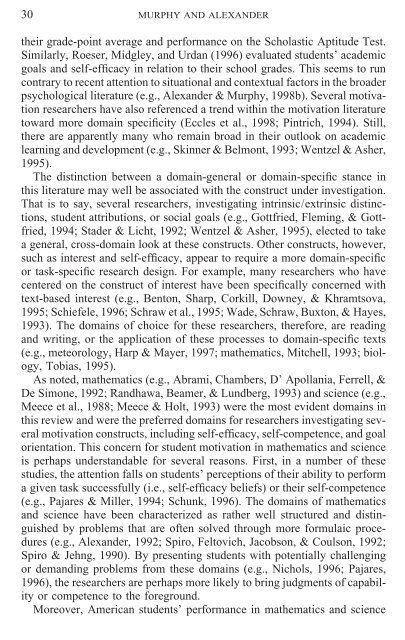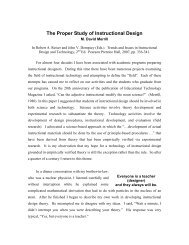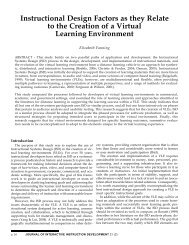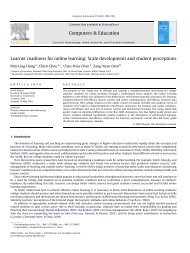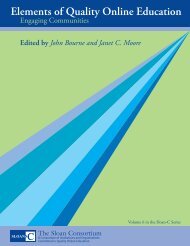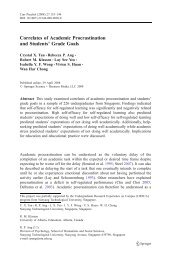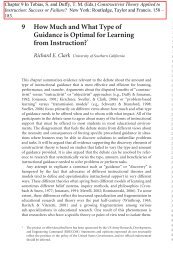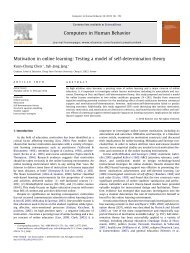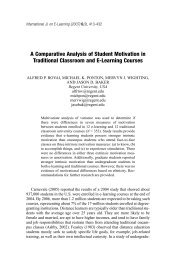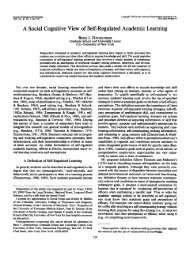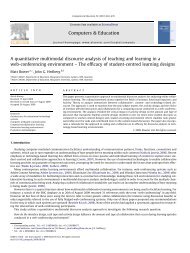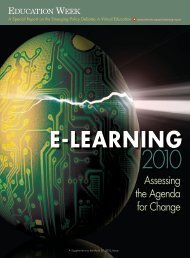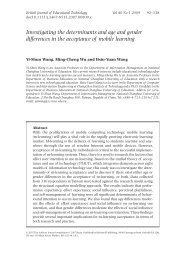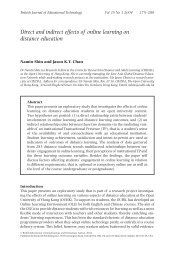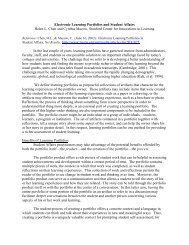A Motivated Exploration of Motivation Terminology - Anitacrawley.net
A Motivated Exploration of Motivation Terminology - Anitacrawley.net
A Motivated Exploration of Motivation Terminology - Anitacrawley.net
Create successful ePaper yourself
Turn your PDF publications into a flip-book with our unique Google optimized e-Paper software.
30 MURPHY AND ALEXANDERtheir grade-point average and performance on the Scholastic Aptitude Test.Similarly, Roeser, Midgley, and Urdan (1996) evaluated students’ academicgoals and self-efficacy in relation to their school grades. This seems to runcontrary to recent attention to situational and contextual factors in the broaderpsychological literature (e.g., Alexander & Murphy, 1998b). Several motivationresearchers have also referenced a trend within the motivation literaturetoward more domain specificity (Eccles et al., 1998; Pintrich, 1994). Still,there are apparently many who remain broad in their outlook on academiclearning and development (e.g., Skinner & Belmont, 1993; Wentzel & Asher,1995).The distinction between a domain-general or domain-specific stance inthis literature may well be associated with the construct under investigation.That is to say, several researchers, investigating intrinsic/extrinsic distinctions,student attributions, or social goals (e.g., Gottfried, Fleming, & Gottfried,1994; Stader & Licht, 1992; Wentzel & Asher, 1995), elected to takea general, cross-domain look at these constructs. Other constructs, however,such as interest and self-efficacy, appear to require a more domain-specificor task-specific research design. For example, many researchers who havecentered on the construct <strong>of</strong> interest have been specifically concerned withtext-based interest (e.g., Benton, Sharp, Corkill, Downey, & Khramtsova,1995; Schiefele, 1996; Schraw et al., 1995; Wade, Schraw, Buxton, & Hayes,1993). The domains <strong>of</strong> choice for these researchers, therefore, are readingand writing, or the application <strong>of</strong> these processes to domain-specific texts(e.g., meteorology, Harp & Mayer, 1997; mathematics, Mitchell, 1993; biology,Tobias, 1995).As noted, mathematics (e.g., Abrami, Chambers, D’ Apollania, Ferrell, &De Simone, 1992; Randhawa, Beamer, & Lundberg, 1993) and science (e.g.,Meece et al., 1988; Meece & Holt, 1993) were the most evident domains inthis review and were the preferred domains for researchers investigating severalmotivation constructs, including self-efficacy, self-competence, and goalorientation. This concern for student motivation in mathematics and scienceis perhaps understandable for several reasons. First, in a number <strong>of</strong> thesestudies, the attention falls on students’ perceptions <strong>of</strong> their ability to performa given task successfully (i.e., self-efficacy beliefs) or their self-competence(e.g., Pajares & Miller, 1994; Schunk, 1996). The domains <strong>of</strong> mathematicsand science have been characterized as rather well structured and distinguishedby problems that are <strong>of</strong>ten solved through more formulaic procedures(e.g., Alexander, 1992; Spiro, Feltovich, Jacobson, & Coulson, 1992;Spiro & Jehng, 1990). By presenting students with potentially challengingor demanding problems from these domains (e.g., Nichols, 1996; Pajares,1996), the researchers are perhaps more likely to bring judgments <strong>of</strong> capabilityor competence to the foreground.Moreover, American students’ performance in mathematics and science


